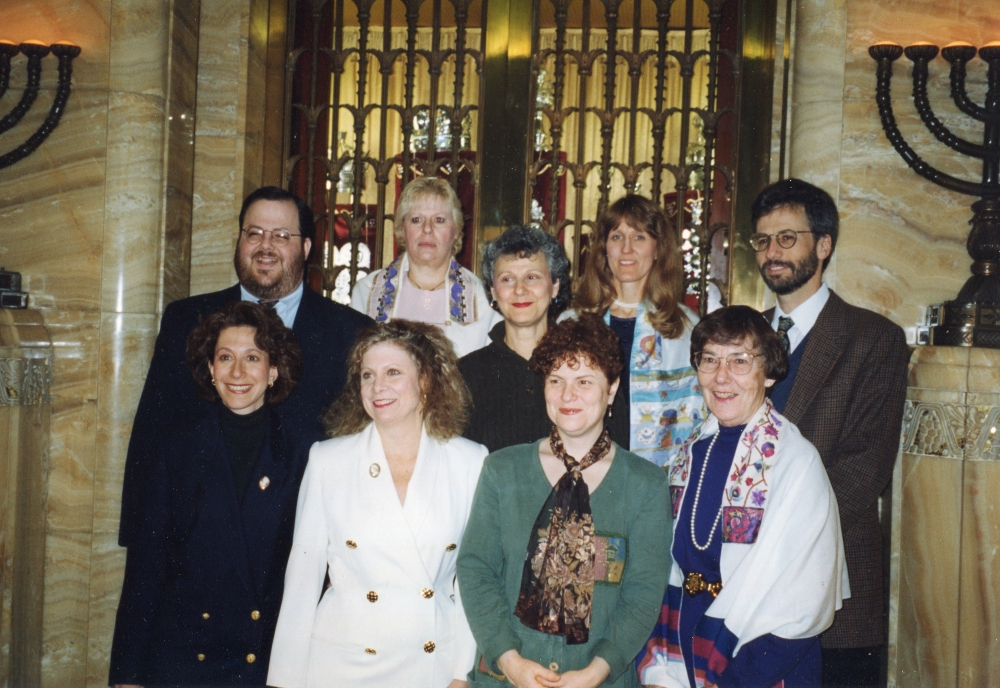Delivered by Bernice on 9 May 1997, Sabbath Eve Service which included B’not Mitzvah Ceremony
Leviticus is a book full of words about sacrifices. Are its words relevant to our lives today? The Biblical scholar Everett Fox, shows me a way to say “yes!”
Professor Fox sees a similarity between Leviticus and the opening chapters of the Book of Genesis where God brings order out of chaos by making distinctions and separations. God’s finished product is a peaceful paradise. So also do the commandments of Leviticus seek to make order out of the chaotic processes of human life, an order which will insure the survival of the community, perhaps even restore it to a state of utopian perfection.
Our Torah portion, Kedoshim, is that part of Leviticus called the Holiness Code. Chapter 19 is the heart of that Code. Not only is it physically near the center of the Torah; it is at the center of Judaism’s value system. The root meaning of kadosh is separation in order to sanctify a person, place or thing for sacrificial purposes. But, as Torah makes abundantly clear, sanctification has implications for every aspect of life, from eating habits to observing Shabbat, from personal relations to business practices.
Rabbi Danny Shiff taught us to think of sanctification as “making a distinction which elevates our behavior to a higher level of importance.” In Judaism, as in other religions, the ideal for human behavior is to make no distinction between proper ethical conduct and religious practices. What Leviticus 19 does so powerfully is to extend holiness to virtually all areas of life. Thus Chapter 19 commands us, among other things, to dispose of sacrificial food at the set time and to pay the laborer promptly; to shun idolatry, yet show kindness to strangers who are idolators by origin. “What does the Lord require of you?” The prophet Micah’s answer was “Only to do justice, to love goodness, and to walk modestly with your God.” Leviticus 19 begins with the priestly answer to that question: “You shall be holy, kedoshim, for I, the Lord your God am holy!” The command is to all individuals in the entire community – kedoshim is a plural word.
Our Haftarah comes from the last chapter of the Book of Amos. Amos, like Micah, preached in the 8th century b.c.e. A herdsman and tree farmer from the southern kingdom of Judah, Amos answers a call from God. He must go to the northern kingdom of Israel and speak out against the corrupt and unjust behavior and hollow ritual practices of the prosperous and powerful. In short, Amos indicts them for perverting all the mitzvot of Kedoshim.
The consequences of this unholy behavior, says Amos, are that individuals will be banished, cut off from their community. The people will go into exile. Order will return to chaos. How can Israel avert God’s decree? By doing what the Lord requires: “Seek good and not evil – Let justice roll down like the waters / And righteousness like a mighty stream!”
But Amos also pleads with God on the Israelites’ behalf. Twice in visions God shows him terrible destruction that will befall the land. “O Lord God,” he cries, “Please forgive – please stop. How will Jacob survive? He is so small.” And God compassionately replies, “it will not happen.” Rabbi Abraham Heschel explains the dual nature of the prophet’s task: “The prophet is not only a censurer and accuser, but also a defender and consoler – In the presence of God he takes the part of the people. In the presence of the people he takes the part of God – the main task of prophetic thinking is to bring the world into divine focus.”
Amos may have given himself permission to speak as he did from a keen understanding of verse 17 which says “You shall not hate your kinsman in your heart. Reprove your neighbor but incur no guilt because of him.” The crucial words in this verse are ho-khay-ach toe-khee-ach, an emphatic repetition of the word translated as “reprove.” We may also translate the word, with better effect, as criticize – criticize your kinsman.
Nachmanides showed the connection between the two parts of that verse when he commented that it is precisely in order to lessen hatred that we are commanded to offer criticisms, to dissolve anger and animosity with dialogue. We tell hard truths so that we can bring peace. The great challenge is to conduct the dialogue with respect, civility, and appreciation for the other’s point of view.
It is easy to draw a parallel from this teaching to the current crisis in relations among Jews of all the streams of Judaism. All are hurling criticisms and accusations; none are consoling. Somehow ways must be found to turn the language of rebuke into the language of forgiveness. We are obligated to criticize but we must do so constructively, with words that heal. Absent this process, I fear greatly for the unity if not the survival of the Jewish people.
Jewish survival has always depended on individuals acting for the good of the community. We know from the testimony of concentration camp survivors that their success depended on social bonding and interchange, on collective resistance, on keeping dignity and moral sense active. Even as they asserted that in the camps “the doomed devoured one another,” they also told how they helped one another in countless small acts of mutual caring.
They formed groups; they smuggled goods; they shared and gave gifts, usually food. Their behavior demonstrated the eternal human desire – even necessity, for survival – not of the fittest but – by doing deeds of loving-kindness. If deeds of loving-kindness contributed to survival in the camps, much more so should they help us survive in the face of our own dissension and diversity. The goal of dialogue must be respect for diversity and unity based on love. The verse that inspired Amos has two parts and the first part is “do not hate your fellow Jew.”
The book of Amos concludes with God’s promise of return from exile and restoration to our land. Amos turns our thoughts with pride and hope to the State of Israel, whose Independence Day, Yom HaAtzmaut, will be observed on May 12, next Monday.
Four years ago, after the death of my mother Ruth Meyer, I decided to become bat mitzvah which I knew she would have encouraged. My mother was my first teacher and example of Jewish values and faith in God. I can hear her whisper “Amen” as I pray for the wisdom to sanctify my actions, to make the distinctions which elevate them to a higher level of importance. As I pray for the guidance to do what God requires of me. As I pray for God to protect the House of Jacob (for we are so small and so few).
Seeking and finding relevance in our ancient texts is an intellectual challenge that also refreshes the wellsprings of our spirit. It will help us hold to the hope that Jews everywhere will learn to criticize and love one another in the ways that God – through our priests and prophets – criticizes and consoles us. Torah study is an ever-present opportunity to learn these Ways, the Ways of Holiness.

